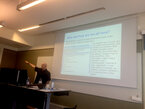Dates: 5-6 June 2018
Venue: Room
B339 at LUX, Helgonsvägen 3, Lund.
How to get here. (Note: Change of rooms)
Speakers:
Randolph Clarke (Florida State University)
Meghan Griffith (Davidson College)
Ishtiyaque Haji (University of Calgary)
Bob Lockie (University of West London)
Timothy O'Connor (Indiana University Bloomington)
Thomas Pink (King's College London)
Michael Zimmerman (University of North Carolina at Greensboro)
Schedule:
Day 1 (5th June)
9:25 Welcome
*9:30-11:00
Randy Clarke: Agent Causation and the Phenomenology of Agency
Coffee
*11:30-13:00
Meghan Griffith: What Happens When Someone Disappears?
Lunch
*15:00-16:30
Ish Haji: Obligation Incompatibilism
Coffee
*17:00-18:30
Tim O’Connor: Probabilistic Explanation of Free Action
Dinner
Day 2 (6th June)
*9:30-11:00
Kristin Mickelson: A Better Basic Argument
Coffee
*11:30-13:00
Bob Lockie: Self-determination and Determination by Reasons
Lunch
*15:00-16:30
Michael Zimmerman: Willful Ignorance and Moral Responsibility
Coffee
*17:00-18:30
Thomas Pink: Freedom as Power
Dinner
— END OF WORKSHOP —
Abstracts
Randy Clarke: Agent Causation and the Phenomenology of Agency
A number of philosophers claim that the phenomenology of first-person agency is agent causal, and that it thus conflicts with theories of action on which actions are caused by—or are causings by—mental events, states of affairs, or states of agents. Given a defeasible preference for a theory of action on which the phenomenology is not systematically illusory, the argument goes, the phenomenology counts against the kind of theory in question. Here is it argued that even granting the characterization of agentive phenomenology as agent causal, it presents no threat to the targeted theory. A distinction is drawn between agent causation that is ontologically fundamental and agent causation that is not fundamental, but instead grounded in causation by mental events, states of affairs, or states of agents. The theory of action in question is compatible with agent causation of the latter kind. And at least in the case of most of us, agentive phenomenology is neutral with respect to the distinction. The phenomenology may be veridical, then, even if, speaking of what is fundamental, it is correct to say that actions are caused by—or are causings by—mental events, states of affairs, or states of agents.
Meghan Griffith: What Happens When Someone Disappears?
One argument used to bolster agent-causal libertarianism is Derk Pereboom’s “disappearing agent argument.” Pereboom’s argument is meant to show that only irreducible agent causation can secure free will. He argues that only agent causation allows an agent to “settle” whether a particular decision ensues. In a recent paper, Randolph Clarke argues that Pereboom’s argument fails because it is not “sufficiently ambitious.” Clarke argues that a successful version of the argument should show that agent causation is necessary for all action, not just free action. I agree. In this paper, I discuss where I think the original argument may lead us astray, namely, by placing its emphasis on “settling.” I argue that our focus should instead be on agential contribution in a broader sense.
Ish Haji: Obligation Incompatibilism
In this paper, I defend obligation incompatibilism—the thesis that determinism is incompatible with moral obligation. The argument unfolds in two principal steps. First, I establish
Moore’s Law: A moral obligation to do something requires both the ability to do, and to refrain from doing, it. Second, I motivate the version of
Moore’s Law that sustains obligation incompatibilism on the basis of considerations about the kind of ability that obligation requires.
Bob Lockie: Self-determination and Determination by Reasons
What is the relation between determination by reasons and determination by a self? How are both possible – as surely they must be. The Mind argument establishes that the freedom needed for agency is not a freedom of William James’ positive indeterminism, it is rather a Jamesian negative indeterminism. This is a freedom of self-determination. Self-determinism, akin to agent-causation, maintains that the classic Hobbes-Hobart dilemma (‘either determinism or randomness’) is a false dilemma – that there is a third option available. Unlike agent-causation, self-determinism is not a substance-causal position. Self-determinism is instead to be assimilated to classical (structural) emergentism and to the 1960’s and 70’s ‘special science’ literature. It distinguishes (after Anscombe) determination from causation. Doubts are acknowledged as to whether self-determinism will be adequate to respond to the most severe metaphysical problems of free will (notably, Kim’s Exclusion Argument). Nevertheless, as a constructive picture in its own right – say, as very high level philosophy of psychology – it is defended strongly. In this regard, the self-determinist position is subject to the criticism that determination via a self in addition to determination via reasons amounts to overdetermination. It is argued that this objection trades on a species of ‘strongest motive’ associationism discredited by Reid. A radically non-associative, agent-relative view of reasons is put forward in opposition to this view.
Kristin Mickelson: A Better Basic Argument
Galen Strawson's Basic Argument concludes that there is no metaphysically possible being who could satisfy the necessary and sufficient conditions on free will (where having free will is taken to be a necessary condition on moral responsibility). More specifically, Strawson takes his argument to reveal that, intuitively, there is a necessary "starting point" (a.k.a. sourcehood) condition on free will which is so demanding that no one could possibly satisfy it
irrespective of the laws of nature. Randy Clarke (2005) argues that the Basic Argument is unpersuasive. The key point of dispute between Strawson and his opponents, says Clarke, is over the truth of a proposition which is not listed among the premises of the Basic Argument (at least on Strawson's formal statements of it). By bringing this key proposition into the Basic Argument as an explicit premise, we see (according to Clarke) that, for all that Strawson says in his argument, this key premise is unsupported. If the Basic Argument is incomplete in the way Clarke claims, it would be right for Strawson's opponents to be unpersuaded. In this paper, I clarify the dialectic around the original Basic Argument in order mitigate the force of Clarke's critique. Then, to address the spirit of Clarke's worry, I add a few new elements to the original Basic Argument in order to shift the full burden of proof (or at least the lion's share) onto its opponents.
Tim O’Connor: Probabilistic Explanation of Free Action
An indeterministic account of freedom of action is sketched within a powers- based metaphysics of the natural world. Three objections to the adequacy of this account, all centered on its acceptance of objective probabilities governing free actions, are considered and rebutted.
Thomas Pink: Freedom as Power
Power is the capacity to produce outcomes. Power occurs as causation - the capacity of ordinary substances or occurrences as causes to produce effects. Power seems also to occur as self-determination - our capacity to determine for ourselves what we do. But is self-determination, as commonly conceived, a form of causation, or a power of a different kind?
Michael Zimmerman: Willful Ignorance and Moral Responsibility
Some agents are willfully ignorant regarding the behavior in which they propose to engage; they deliberately forgo the opportunity to inquire into the features that determine the behavior’s moral status. Examples include driving a car across an international border, suspecting that—but not verifying whether—the car contains contraband; buying cheap clothing, suspecting that—but not verifying whether—it was manufactured in a sweatshop; and so on. The law (when it applies) typically holds such agents to be equally as culpable as those who engage in the same behavior but who are not ignorant of the relevant details, and legal and moral philosophers have tended to agree with this verdict. In order to assess this verdict, I present a paradigm case in which ignorance of wrongdoing affords its agent an excuse for that wrongdoing, and I compare and contrast this case with a paradigm case of willfully ignorant behavior. I argue that in many cases willfully ignorant agents are not equally as culpable as those who engage in the same behavior while knowing full well what it is they are doing.






